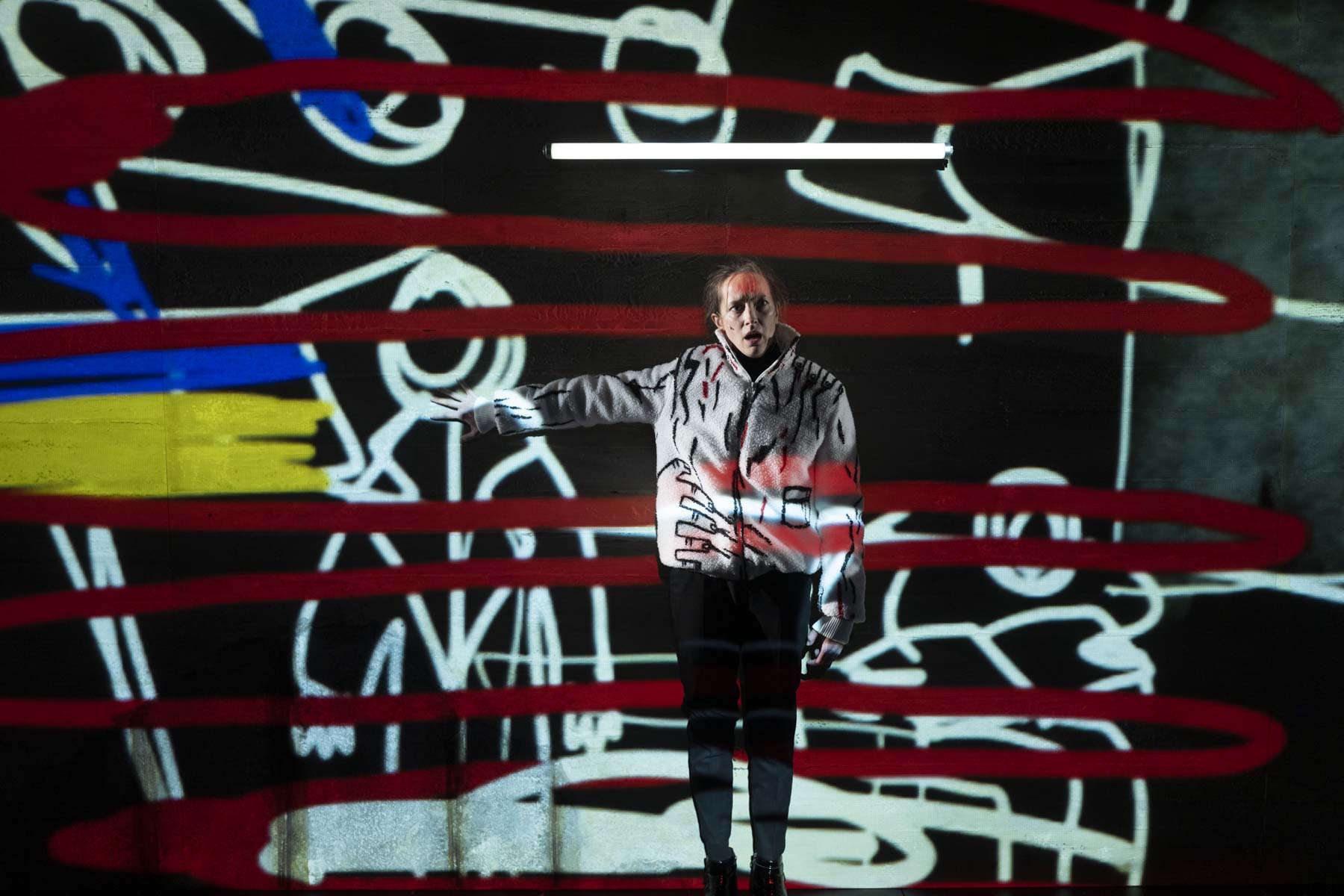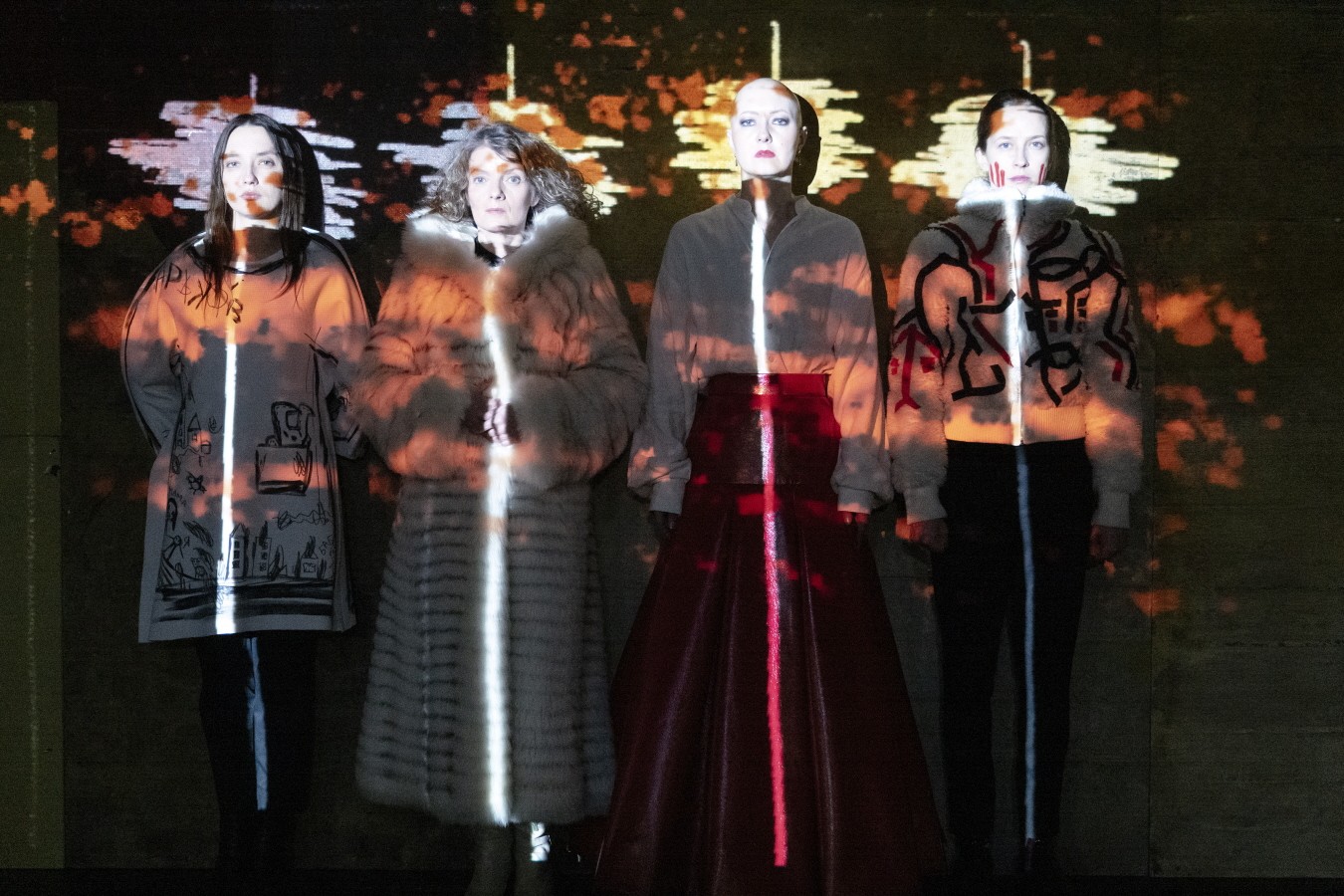Finally another success at the Munich Kammerspiele
Jan-Christoph Gockel directs «Green Corridors» by playwright Natalia Vorozhbyt. Crass and touching.
Four women stand in line to Europe. They come from Kiev, Kharkiv, Butsha and Chernihiv, they want to escape the war. Now they are leaning against a wall as if made of concrete, which greatly reduces the size of the Therese-Giehse-Halle of the Munich Kammerspiele, bringing the action close to the audience. They want to get out of Ukraine, while the wild geese fly back there from warmer countries. A goose shits on their heads. You can’t see that, they just say that.
Natalia Vorozhbyt, born in Kiev in 1975, is currently an in-house playwright at the Kammerspiele. She wrote her play «Green Corridors» for the house and in dialogue with the theater, an exuberant, bizarre, painful, sarcastic and also kidney-gripping topography of war. Not of battles, but of what war does to people. Vorozhbyt is blessed with abysmal black humor. Her play is fabulous. So is Jan-Christoph Gockel’s production.
Now they stand in the Green Corridor, the escape route for civilian victims, and illustrator Sofiia Melnyk introduces them, writing clues of their biographies on the wall. During the performance Melnyk draws what is projected on the wall, the white shadows of the fugitives, animals, people. To this, Anton Berman (he also plays a border guard at times) makes music, sometimes too much, he controls the emotions that are there anyway.
Jan-Christoph Gockel is rarely squeamish in his choice of means, here his exuberant approach fits perfectly. Because otherwise one would hardly be able to master this piece, of whose content only splinters can be reproduced here. In addition to the stories of the fleeing women, there are numerous other characters, such as a film director, played by the wonderfully exhilarated André Benndorff, who, even as a Ukrainian with a Canadian passport, collects dogs in the war zone, purebred Spitz, in order to sell them in the West. As director, he shoots historical scenes with Belesova about the poet Olena Telina, who was murdered by the Nazis in Babyn Jar, about the Ukrainian nationalist leader Stepan Bandera, who wanted an independent Ukraine with the help of the Nazis and was murdered in Munich in 1959, about the composer Mykola Leontowytsch, who was too popular for the Soviets — they killed him in 1921. Three people who, in completely different ways, stand for the attempt of an independent, self-confident Ukraine. The filming scenes are wacky, fast-paced, like everything else here, biographies intertwine, the actress is regularly recognized as one who starred in Russian serials, and then is slain by the other women. Also because her cosmopolitan posturing is annoying.
Belesova plays fabulously, her three female colleagues from Ukraine are fabulous. At first they speak mainly Ukrainian (with supertitles), then more and more German, they arrive at the vanishing point. Where Johanna Eiworth lurks for them, as a do-gooder European of all kinds, always hysterical, always loud — the Ukrainians play her to the wall.

Once all means stop — and one hears the story of a rape
Then all means stop. Tanya Kargaeva tells what happened to the nail designer. Tells how she was raped for days. «You don’t want to hear details now … or do you?» She is heard. The soldiers fled Butsha, locked her up beforehand, set fire to the mattress. It was too damp to burn. Then Kargaeva pokes the wall with a finger, it falls down, without a sound, just a breeze. She takes a bow.
The bizarre humor is matched by the hope at the end. Belesova emerges as Milla Jovovich from the movie «The Fifth Element» futuristic weapons in hand, ready for the «Big Badabumm.» And the women leap out to the side, into the light, into a freedom.

